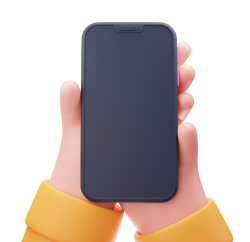
Got a Project? Tell us about it!
We are a leading custom software development agency focused on web, mobile app development & SaaS application development & MVP Development.
Cross-platform mobile app development: Definition and Frameworks
- Mobile app development
 Statista: Cross-platform mobile app development[/caption]
Statista: Cross-platform mobile app development[/caption]
Our experienced team of UX/UI designers and developers will help you stand out with a beautifully designed UX/UI.
Simply put…
Cross-Platform mobile app development is building an app to run on multiple operating systems, instead of creating specific versions for each O.S. You can think of it as creating a product that will thrive in more than one market/environment. Operating systems are like different digital environments, where each product (app) is designed to function properly in all or one of these digital environments, this work is only accomplished by cross-platform mobile app development.Cross-platform mobile app development Frameworks
Sometimes it is not enough to know something works or is widely accepted, that is why we decided to take it up a notch with frameworks. A Cross-platform mobile app development Framework is a system that allows developers to build apps that run on multiple operating systems. It allows them to create faster, easier, and more efficiently. There are a good number of app development frameworks, but for you, we have carefully selected the best, widely used ones here in this section of the article:Our experienced team will help you stand out with a bespoke, flexible, and scalable software application for your business.
1. Flutter:
This is no new name amongst developers. It is considered one of the best frameworks for developing quality, top-performing web apps. Flutter is a product of tech giant Google, it was launched in 2018 as an open-source advanced software development kit (SDK). This framework promises certain features like:- Visually appealing UI elements and widgets (A great number to select from)
- It allows programmers to view changes in their coding, live, without ever having to save their work with their reload feature.
- A rendering engine that allows developers to quickly customize animations.
2. React Native
This mobile app development framework is a product of another tech giant, Facebook. The big brand came up with the concept and launched it in 2015. The React Native is a cross-platform framework that runs on Javascript, which allows for the development of native rendered apps that run on both Android and IOS. Just like Flutter, React native also has a Hot-reload feature, which allows developers to view/monitor changes in their codes without having to save them first. It gives attention to the mobile user interface, which gives it a very simple look. It is also important to note that the React native permits access to third-party plugins.3. Xamarin
Launched in 2011 this cross-platform app development framework started independently until it was bought by a tech company; Microsoft. This open-source framework is designed to solve problems like disjointed native technology stacks - the reason behind difficult and expensive mobile app creation. The Xamarin cross-platform framework runs on C#, thus works perfectly on a variety of platforms. It has a raving community of over 60,000 contributors worldwide. But on the flip side, it might be a teensy bit expensive for enterprises (although it is free for individuals and startups). Plus it does not support apps with heavy graphics and has limited access to certain libraries.4. AdobePhonegap
Owned by another big tech brand Adobe, also formerly known as Apache Cordova, The PhoneGap framework is very simple and runs on Javascript, HTML5, and CSS. The framework offers a multitude of benefits like a cloud solution to create a directory, a share function to share with your team and receive feedback, access to third-party tools, a good number of plugins, and a thriving community. On the other side if you want to create high-performance apps like games the framework might not be your best bet. It is built on IOS SDKs and depends on Mac to download these SDK.5. Ionic
If you want speed, the Ionic mobile app development framework has speed. This open-sourced framework was licensed under MIT and translates using HTML5. Quite similar in design to AngularJS, it adopts certain features from both Android and IOS. Ionic enables you to build hybrid apps for PWA - progressive web apps, android, and IOS. Designed specifically for mobile O.S, Ionic runs on a SAAS UI framework, which provides UI components for powerful apps. The framework allows you to ship constantly. It is supported by a community of over 5M developers in over 200 countries around the world. On the cross side of the framework, knowledge of AngularJS might be mandatory if you are to go beyond creating basic apps.Progressive Web App cross-platform Frameworks
Choosing tools to build a functional cross-platform progressive web app is no easy task, but thankfully, we have done all the heavy lifting and have come up with what we consider (after an insane amount of research plus years of experience as experts in this field - check out our reviews if you are not convinced) the top best progressive web app development tools/frameworks:1. React.js
Popularly known as React, this PWA framework created by Facebook runs as an open-source (as of 2013) Javascript frontend framework that supports fast effective development of software interfaces. According to Stack Overflow’s annual survey, 2020 React was graded second place as the most loved development framework Note: Do not make the mistake of replacing the React.js for React used for creating native mobile apps. They are completely different as one is made for PWA and the other for Native apps. Benefits of the React Native:- SEO friendly: Because the app is read like a website, crawlers can read the app, and can appear in related searches, giving it bigger publicity.
- It is stable: Changing from one structure to the other does not affect its functionality.
- A thriving online community
- It comes with a massive developer toolset
- Quite easy to start
2. Vue
Vue.js is a JavaScript framework adopted by developers all over the world for its decoupling capacity, it is as well used in creating user interfaces and basic/simple-page web apps. The framework created PWA for popular brands like Gitlab and Alibaba. Here are some benefits:- Small file size: The zip file ways 18kb, it is super fast and easy to install on your device
- Vue is an excellent framework for unit testing
- Like we mentioned earlier, Vue is perfect for coupling for instance multiple files in HTML, CSS, and JavaScript
- Good performance
Our experienced team of android developers will help you stand out with a efficient and fast mobile app for your business.
3. Angular
Angular is an open-source framework used for cross-platform mobile app development. It leverages HTML Typescript to create one-page web apps. It is owned by Google and considered one of the most powerful and popular Javascript frameworks. Benefits of Angular:- What makes Angular so amazing, having known that HTML documents are static, the framework makes it possible to convert these documents to dynamic content.
- It is created with a Model-view-controller. This data change in the model application will cause changes in the view of the application as well
- And like every other framework is has a large community that supports the development of the framework.
First: What is a Mobile app?
Just before you dive right into this rich body of content, why don’t you recount (‘case you forgot) how in the world a mobile app is defined. Simply put, a mobile application is a software program that can be downloaded or accessed via a mobile device. To use a mobile app you have to first download the app (some apps are inbuilt), install, and launch on your mobile device. Some apps require internet access while others don't. With the app development market currently worth over $7.9 billion, Google's Playstore alone worth over $2.6 million, businesses cannot afford to miss their share of the cake.The Mobile app: How it all began
Since 1983, the mobile app has been at the forefront of technological advancement. The world’s first mobile app is considered by many to be Nokia's “Snake game”, but we see IBM’s Simon communicator in the scene long before they or Steve Job’s apple store. The Mobile app preludes the smartphone since the inception some 29 years ago by IBM. The world’s communications have witnessed tremendous shifts, evolving into one of the world most used device with multiple functionalities, the smartphone enables its user to:- Surf the web
- Internet banking
- Remote work
- Entertainment
- Reminders
- Map navigation
- Brand building
Summary
Cross-platform mobile app development is the best alternative to the old native, traditional development. Just as we have mentioned in this article, Cross-platform mobile app development is the best thing that can happen to a developer or company that wants to yield massively by launching their mobile app on multiple platforms. This reason amongst others is why Cross-platform mobile app development is steadily rising in application and popularity. The cross-platform method used depends on the kind of app you want to create. In this article, we discuss two major services:- The Progressive web app development framework
- Native
Got a Project? Tell us about it!
We are a leading custom software development agency focused on web, mobile app development & SaaS application development & MVP Development.
Subscribe to Our Newsletter
Join over 5,000 enterpreneurs and businesses who already have a head start.
Got a Project? Tell us about it!
Our Engagement Models
OUR PRESENCE
BLOCKCHAIN
OTHER SERVICES WE OFFER
CONTACT
Copyright © 2022 Mobirevo Software & Technologies LTD a company duly registered with CAC with RC Number: 1756190. All rights reserved.

Got a Project? Tell us about it!
We are a leading custom software development agency focused on web, mobile app development & SaaS application development & MVP Development.




